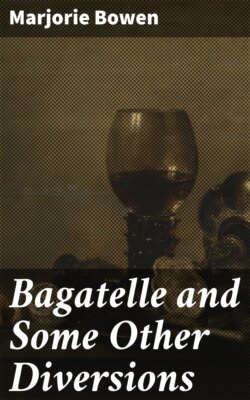Читать книгу Bagatelle and Some Other Diversions - Bowen Marjorie - Страница 3
На сайте Литреса книга снята с продажи.
Оглавление"
PROLOGUE
Table of Contents
The Author who offers these tales has called them Bagatelle (a game, a diversion, a trifle), having been moved to write them through the poignant appeal of those aspects of the past, the decorations of peoples and an age long since gone, which to most appear but a game, a trifle—bagatelle. They might be named, too, stories of empty palaces, of closed mansions, of deserted castles, built to affront the enemy in the game of war, or to entertain the friend in the game of pleasure.
The roofless towers of Karolsfeldt where the oak grows near the hearth of the great hall and the trees of the heavy forest have encroached up to the fallen walls—the tarnished mirrors in the gilt and stucco pavilions hidden in airy woods or agreeable parks—a lonely villa on the Brenta—a straight-fronted, shuttered palace facing the fountain where the gladiators washed their wounds outside the Roman Coliseum—a secret and dark-balconied residence in a narrow street of Madrid—an extravagant château close to the Russian frontiers...These places in their loneliness, decay, neglect and partial ruin still mark the quiet solitudes or forgotten streets of European cities and possess for some a bitter-sweet fascination.
These dwellings, where the long-since dead kept their toys and beguiled the nostalgia for the unattainable (with which we are all so desperately familiar), are easily peopled by phantoms that soon take a definite shape and play out their own story without any help from the writer, who takes the part rather of transcriber than that of author; he is, at least, conscious of no invention and endeavours to describe people and scenes that arise as naturally from these ancient habitations, parks, pleasaunces, as mist from a lake at the close of an autumn day, or pungent perfume from a plucked and dying flower.
Some of the episodes are grim enough; behind the ribbons, the lutes, the cupidons, grins the mask of tragedy; yet—bagatelle—all of it, for these people are dead and seen through the medium of a dream.
They inhabit no known country, but they claim an eternal existence in those memories of the past that torment, perplex and solace some of us; they are purged of grossness; gorgeous ghosts, they enact their parts splendidly, their passions are romantic, their actions seldom lack the heroic outline; since they died their persons have taken on a richer beauty, their characters a nobler cast; they are grander than when they lived; so much we may allow them in recompense for the dust that covers their memories.
Their tragedy shows through a veil of resignation; their comedy is hard, cynical and grotesque, they have a little the air of actors who have played the same part many times, for they are perfect in their words and easy enough to flourish in their gestures; most of them are profoundly lonely and some profoundly unhappy; all feel cheated, thwarted in ambition or passion, or dissatisfied to agony with the bagatelles of their moment.
It may be protested that they are to the last degree artificial, mere puppets adorned with tinsel, but to those who understand them they have the essence of accomplished, successful humanity, disappointed (as always) in its final achievement; they are worldlings defying their own negation; they are creatures who pile up games and trifles at higher cost with fiercer greed, the more they realize their own futility; the men taste the brittleness of success, the women the limits of beauty; all, men and women, pursue each other in vain hoping to clasp the long-lost, the perfect lover, and always embrace delusion.
Their world is opulent about them and all is man-created; they move in palaces, pavilions, parks, gardens; if they glimpse a cottage, a heath, a field, they turn away wearily; the open country means a battle, a hunt, or boredom; to a siege, a chase, a march, a journey, they desperately carry the elements of carnival, music, players, clowns, dwarfs, fine clothes and furniture.
They discuss philosophy (that cloudy disguise of lack of faith), they bandy terms, but they believe in nothing save their own secret and endless disappointment.
The writer who has evoked them despairs of rendering them as they appear to his "inner eye," but has not lacked earnestness in the attempt.
